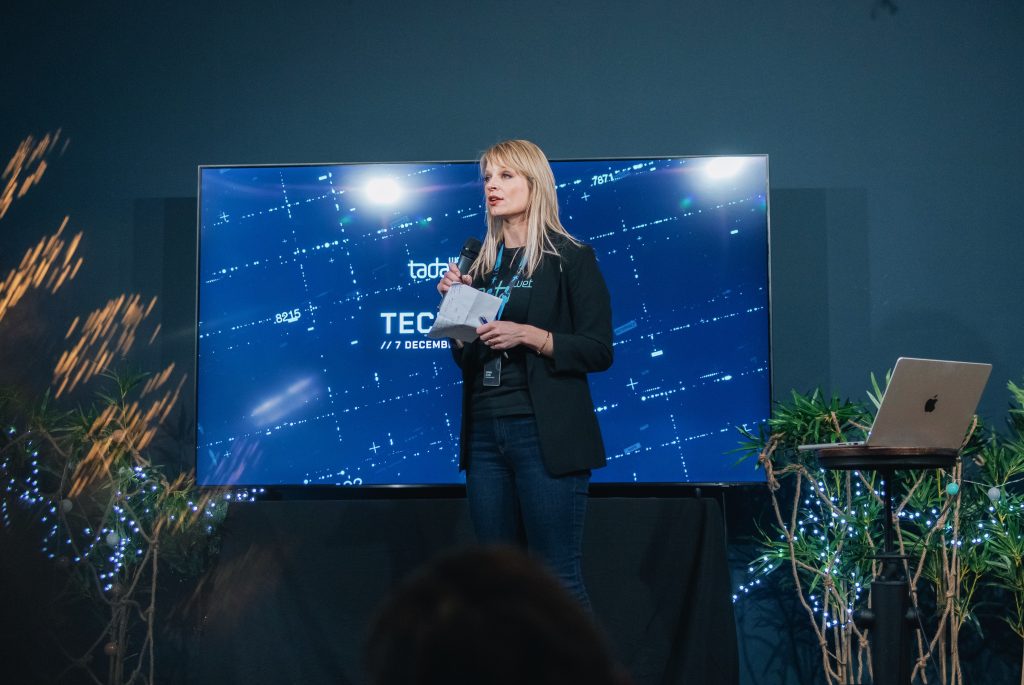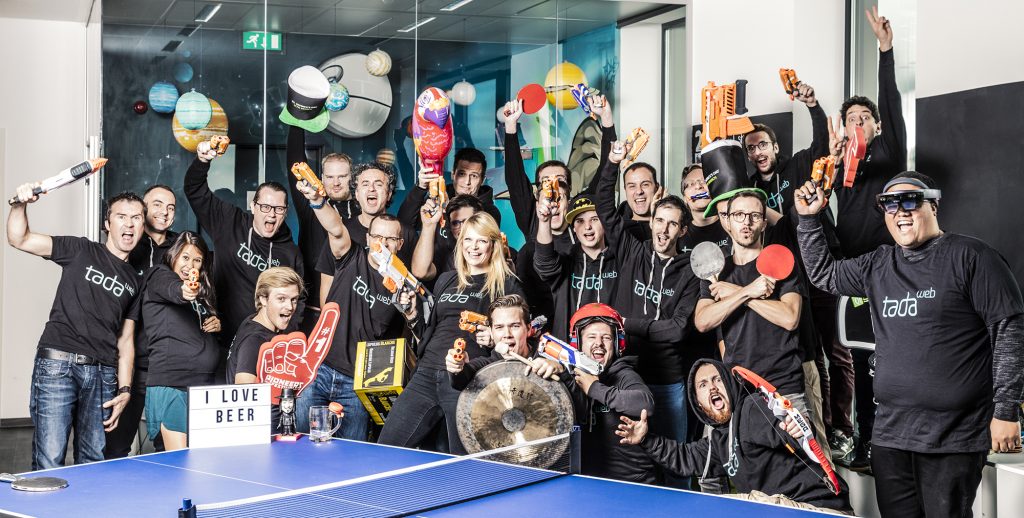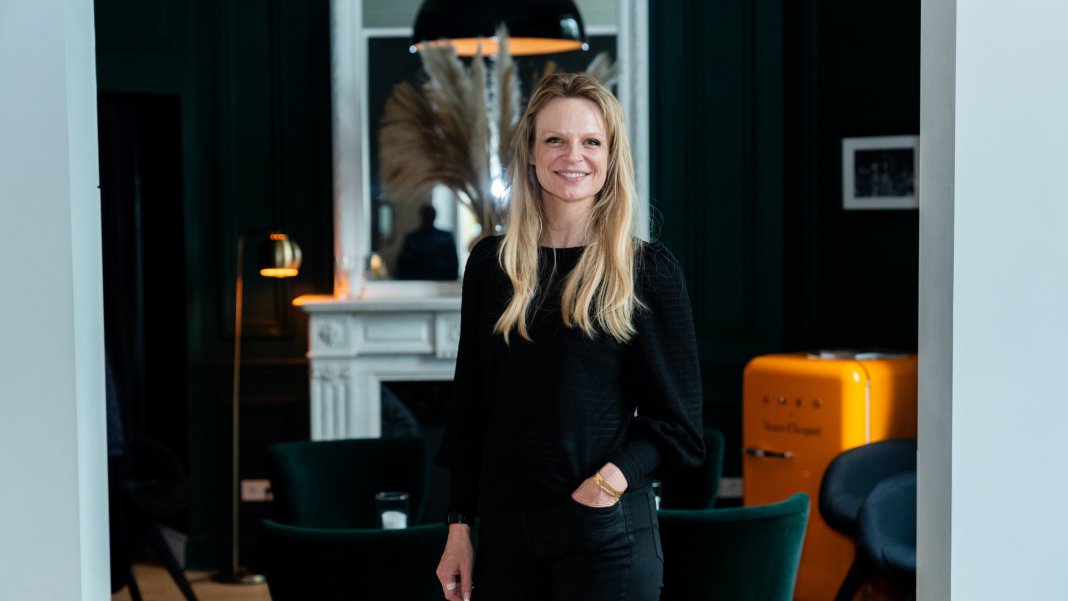Tadaweb’s Genna Elvin is reshaping tech leadership in Luxembourg. After recently raising $20M, she is scaling the company with empathy, impact and a belief that “nothing is impossible”.
The first thing you notice about Tadaweb’s Luxembourg office in Belval is the light. Floor-to-ceiling windows flood the Belval space with sunshine, illuminating rooms filled with beanbags, a ping-pong table, and a glass-walled boardroom where Genna Elvin, co-founder and Chief Tada Officer, sits at her laptop in a fitted polka dot shirt.
Belval, a former steel site turned innovation hub, hums with students, startup founders, and tech workers. Once empty storefronts are now filled with trendy cafés, a tattoo shop and gyms. “I’m a big gym freak”, Elvin confides. It’s one of the ways she handles the pressure of leading a fast-scaling tech company—along with a close-knit circle of friends who keep her grounded.
Learning Resilience
Since co-founding Tadaweb in 2011, Elvin has helped grow the firm into a 150-strong team with offices in North America. What is more, Tadaweb recently raised $20M, a huge sum for a Luxembourg scale-up and a woman founder. The cash injection will support product development and hire further talent to fuel its global expansion and go-to-market across public and private sectors. It’s an exciting time but Genna is calm and composed.
She admits resilience was learned the hard way. “In the early days, I used to have what I would call kitchen floor moments where I would literally sit down, stare at the ceiling and think, ‘Oh my God, it’s the end of the world!’” she says, laughing. “But over time, you realise you always find a solution. It brings a certain sense of wisdom. And a core value we’ve had since day one is that nothing is impossible.”
Her leadership philosophy is grounded in emotional intelligence and strategic foresight, a style shaped by her New Zealand upbringing. Raised by a single mother who encouraged her to follow her passion, Elvin was surprised by the skepticism she faced after relocating to Europe. “On the one hand, Luxembourg wanted to become a startup nation, and on the other, people were saying, ‘You’ll never build a mini Google in Luxembourg!’”
She turned that doubt into motivation. “We’ll show them,” she says, smiling. Today, Luxembourg is home to over 600 startups, the fourth-highest number per capita in Europe. Elvin has been central to that momentum—not only through Tadaweb, but as a mentor, Fit4Start judge, and president of PULSE, an advocacy group for startups.

How do you define your leadership style?
My leadership philosophy is rooted in the understanding that, at the end of the day, we’re all human. Titles aside, we function on the same emotional bandwidth — we have families, lives outside the office, and challenges that don’t clock out at 6 p.m. I lead with that awareness. I believe in creating a space where people feel psychologically safe to disagree with me — even challenge what was said at a town hall — without fear or formality.
It’s not about top-down direction; it’s about servant leadership. My role is to elevate the team, remove friction, and help them see their own potential more clearly. Leadership isn’t about being the loudest voice in the room — it’s about listening with intention, enabling growth, and making sure no one feels like they have to leave their humanity at the door to succeed.
You once told me you baked cakes for your team every weekend. Do you still do that?
I would spend about five or six hours every Sunday just baking, which is kind of good for stress. For sure, baking and cooking is my absolute passion. I stopped because of COVID. But also because once we had the Paris and North America offices, it wasn’t fair on them.
How do you measure the success of your leadership?
I measure my leadership on how much impact my team can achieve. To measure this, we have carefully crafted an impact matrix, a mix of tangible and intangible success factors, mixed with how they embrace our culture, how much interaction they have with teams horizontally as well as vertically.
How did you develop this system?
In our team we had ex-Googlers, ex-Microsoft people and ex-Amazonians. I wanted to understand how these amazing companies do things to create something that we can apply here at Tada. In the last three or four years we’ve reached a place where people really understand: ‘Okay, I’m going to do my job, and I know that I want to improve on how much impact I’m having.’
Tell me about Tadaweb innovation and ethics culture.
We work with some very serious customers that they need to ensure that the data that they’re accessing has been collected in a way that is completely ethical.
That means our platform is completely built on transparency and understanding. Nothing is black box. With the emergence of generative AI right now, now is the time where ethics and transparency need to be at the forefront. Because if it’s not, the speed in which things are developing, we’re setting ourselves up for a huge risk.
“With the emergence of generative AI right now, now is the time where ethics and transparency need to be at the forefront”
What’s something about Tadaweb’s internal culture that would surprise an outsider?
If we’re working with our customers directly when they come to one of our offices, the last thing they expect to see is a giant inflatable gorilla and a Yoda. I think what sets us apart from everyone else is this juxtaposition of very advanced tech and market knowledge vs ‘Wow, you guys playing ping pong before making a customer call?’
It’s a breath of fresh air that shows them we’re agile, and willing to provide what they need in a way that is conducive to having fun and being relaxed.
What will truly accelerate gender equity in leadership?
I dream of the day where the cover of a magazine is not ‘female leaders’. And every single time I have to speak on International Women’s Day I say: ‘I’m sad that I’m having to speak at this event’. I understand why it’s being spoken about, because we simply are a minority. I think that role models are extremely important and that’s one of the main reasons I agree to being considered a ‘female leader’. I want the next generation of women to be less scarred by that kind of title. I want them just to look at articles or videos and say, ‘Wow, If she can do it, I can do it!’
What role does self-doubt play in your leadership?
I doubt myself every single day. But I don’t always see that as a bad thing. I think it makes you really question your decision making. The most important thing is not to let that self-doubt overshadow your thought process. Acknowledge it, say thank you for being there, but don’t let it overshadow things. It’s taken years of personal progress to do this.

How are you preparing yourself and your team for the complexity of AI integration?
We need to put the human in the driving seat when it comes to AI. We have amazing tools available to us but we can’t let them dictate our actions. We have to be extremely careful about security, to ensure that it’s still us kicking off the process, it’s us that has the know how. And it’s still us that’s developing the code. The message that we’ve given to the team is it needs to be your co-pilot. We see it purely as the calculator. We also have to understand that we can’t deny it either. And so it’s about finding that really strategic balance between risk versus efficiency.
Do you think CEOs of the future will look more like technologists, philosophers, or psychologists?
Honestly? The best CEOs of the future will need to be a blend of all three. They’ll need the curiosity of technologists, the wisdom of philosophers, and the emotional insight of psychologists. Leading in an AI-powered world requires more than vision — it demands discernment, empathy, and the ability to ask the deeper questions. I often laugh and say, “thank goodness I studied psychology, because I often feel like a key part of my job at Tada is being a therapist.” As technology accelerates, the human challenges become more complex. It’s no longer enough to know what’s possible — you have to understand what’s desirable, ethical, and sustainable. That’s where a philosophical and psychological lens becomes essential. So, while technical skills will always matter, the ability to lead with empathy and ethical clarity will define the truly transformative leaders. There is far more emotion than one may think in building a technology company!
What would you want your legacy to be?
I had the amazing opportunity to meet Jacinda Ardern, the former New Zealand prime minister. She taught me that you can lead soft but strong. She leads with empathy. She listened to people, she thought about things. I guess I want my legacy to be just because you’re young, just because you’re foreign, just because you lead with empathy, you can still achieve great things in a cut-throat, male-dominated business setting. Don’t be afraid to show that human side of things to people. Don’t be afraid to connect to people. Don’t be afraid to say that you made cookies fearing that it’s such a feminine thing to do. Don’t be afraid to speak up and completely change the mentality of people that see these things differently.
Information box
Founded: 2011
Activity: Tadaweb specialises in open-source intelligence (OSINT). It provides platforms and tools that allow organisations—especially in defence, security, and law enforcement—to gather, analyse, and visualise information from publicly available online sources.
Present in: HQ in Luxembourg (4000m2), with offices in North America, London and Paris
Team size: 115 FTEs
Customers: Public and private sector in the areas of public safety, national security and corporate risk management
Growth metrics: 27% net revenue growth in FY2024; Expansion into 2 new high-value markets including US; Large customers across 8 geographies.

This article was published in the 6th edition of Forbes Luxembourg magazine.
Read more articles:
Talent Retention Starts (And Sometimes Fails) At Letter A
Luxembourg Investors Brace For Global Market Shock As Trade War Fears Mount
Luxembourg Faces Wealth Decline Amid Global Surge

